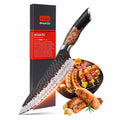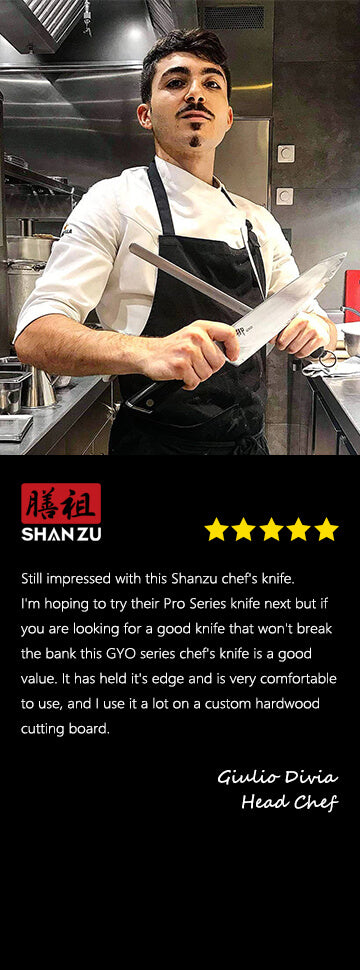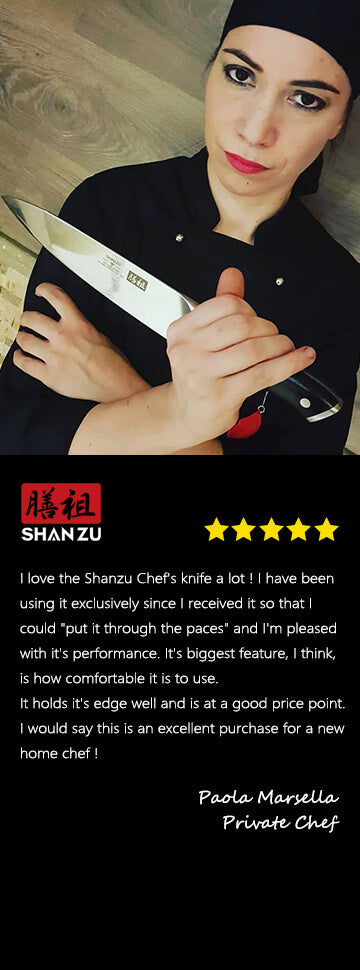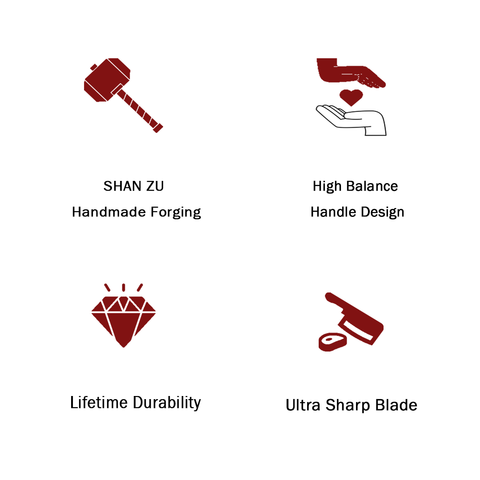L'avis de Nos Chefs Pros
Ne nous croyez pas sur parole, lisez ces témoignages!
Rejoignez le club exclusif SHAN ZU!
What matters most to you
Free standard delivery on all orders. Kitchen knife
*The following regions are excluded: United Kingdom, Ireland, Australia, Canada, Africa, Middle East.
Kitchen knife
*The following regions are excluded: United Kingdom, Ireland, Australia, Canada, Africa, Middle East.
Delivery time depends on the destination. Generally, it takes between 3 and 14 days. International shipping is possible to most countries. If we cannot deliver to your country, we will contact you. In addition, we will notify you of your order by sending you an "Order Confirmation" and a "Shipping Notification" after you place your order.
Returns are accepted for 30 days from the delivery date, in accordance with our refund policy. Simply send us an email and we will let you know what to do next.
SHANZU Official Email: shanzu@shanzuchef.com
To clean and maintain your knife, it is best to follow these steps:First, clean the blade with warm water and dish soap. Be sure to rinse and dry the blade thoroughly to prevent rust.Next, use a sharpening steel to sharpen the blade.
Next, use a sharpening steel to sharpen the blade. This will help maintain the sharpness and ensure that the knife is in good working order.
If the blade is very dirty or has food stuck on it, you can use a soft-bristled brush to gently clean it. After cleaning and sharpening the blade, apply a thin layer of oil to the blade and handle. After cleaning and sharpening the blade, apply a thin layer of oil to the blade and handle, to prevent rust and keep the knife in good condition. Finally, store the knife in a safe, dry place away from heat and humidity. Finally, store the knife in a safe, dry place away from heat and humidity. A knife block or knife drawer organizer is a good option, as it will protect the blade and prevent accidents.
To sharpen a knife you will need a stone SHANZU sharpening tool or knife sharpener. To use a sharpening stone, first soak the stone in water for about 10 minutes. Then, lay the knife flat on the stone and tilt the blade so that it is at a 10 to 15 degree angle to the stone. Using long, steady strokes, move the blade back and forth across the stone, making sure to maintain the angle of the blade. After a few strokes, move the blade to the other side of the stone and repeat the process. You should sharpen the entire length of the blade, and you may need to repeat this process several times to achieve the desired level of sharpness.
What is Damascus Steel?
The origin of the name "Damascus steel" is controversial: two Islamic scholars, Al-Kindi and Al-Biruni (c. 800-873 CE), both wrote about swords and sword steels based on appearance, the geographical location of where they were produced or forged, or the name of the swordsmith. Both authors also mention the terms "damscene" or "damascus" when describing swords to some extent.
Based on these references, there are three possible sources where the term "Damascus" comes from in the context of steel:
Al-Kindi refers to swords forged in Damascus in Siberia as "Damascene," but it is important to note that these swords are not described as having a wavy appearance on the surface of the steel. Al-Biruni refers to a swordsmith named Damasqui who made swords from crucible steel. In Arabic, the word "damascus" means "watered," and Damascus blades are often described as having a water pattern on their surface.
The most common explanation is that the steel is named after the capital of Syria, Damascus, the largest city in the ancient Levant. The most common explanation is that the steel is named after the capital of Syria, Damascus, the largest city in the ancient Levant. This may be due to swords being made or sold directly in Damascus, or simply the appearance of the typical patterns, compared to damask fabrics, which are also named after Damascus.
What is German steel?
German knives are usually made of stainless steel, which has a Rockwell index of 56 to 58. Stainless steel contains chromium. This is what lowers the Rockwell index. The advantage is that the knife blade is resistant to corrosion and rust.
Chefs generally agree that German-style stainless steel knife blades are more durable than Japanese-style blades. Chefs generally agree that German-style stainless steel knife blades are more durable than Japanese-style blades. Its durability allows you to use it for more cutting and chopping tasks.
The softer characteristic of steel still allows for a sharp edge, but stainless steel will require you to hone and sharpen it more often. The softer steel also makes it easier to sharpen the blade, although a stainless steel blade means a German knife will lose its edge more quickly than its Japanese counterpart, which is made of high-carbon steel.


















